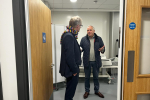
I’ve received many emails concerning the NHS in recent months and am writing this post to address some of the most common points raised. Some of you have emailed me with personal stories of how you and your loved ones have been impacted. Thank you for these.
As you may have already seen, I recently posted online the video of an interview I conducted with Dr Nick Maurice of Marlborough, a GP with a family history of local community doctoring. Our conversation highlights the very challenging state of the modern NHS, which has changed beyond all recognition from the service that was founded in 1948 - when, remember, it was expected that demand for healthcare would fall as people were treated for free, and therefore became healthier. It hasn’t worked out like that.
We need profound change in our society and the structures of the health service to achieve the ambition of a healthier population, which is now a critical national priority. I am pleased that the Government is seeking to improve the system as well as making important investments in the local NHS - including in our area (see my post here on the Devizes health campus, for instance)
Turning to the emails I have received, there have been concerns about nurses’ pay, ambulance delays, bed blocking, junior doctor strikes and local services. I will address these in turn.
Nurses’ pay
I am pleased to see that for 2023-24, the Government offered NHS staff a 5 per cent consolidated increase in pay, worth at least £1,065. I am pleased that the NHS Staff Council – which includes unions and NHS employers – has voted to accept this pay deal.
Ambulances
It was a positive step for patients that trade unions representing ambulance workers paused strike action in March, which opened the path to negotiations with the Government and NHS Staff Council to find a fair and reasonable settlement. As a result of talks between the Government, NHS employers and the unions, the Government offered NHS staff (including paramedics and 999 call handlers) a 5 per cent pay rise for 2023-24, as well as a one-off payment of worth at least £1,655 to top up the previous year’s salary.
The Government also recently consulted on the minimum service levels (see post here) that ambulance services should be expected to provide during future strike action. This includes proposals to ensure that all 999 calls can be answered by ambulance control room staff, and that non-emergency patient transport services are in place to support patients with conditions like renal failure and cancer. I look forward to studying the Government's response to the consultation when it is published.
Bed blocking
Thank you to those constituents who have emailed in solutions to bed blocking. The government has announced new measures to combat this pressing issue.
A £500 million Adult Social Care Discharge Fund has been established to reduce delayed discharge. £600 million will be distributed in 2023-24 and £1 billion in 2024-25 through the Better Care Fund to get people out of hospital on time into care settings, freeing up NHS beds for those that need them. Furthermore, 3,000 ‘hospital at home’ beds will be created before next winter which will deliver the ambition to see up to 50,000 elderly and vulnerable people supported a month.
In January 2023, the Government announced that an additional £200 million will be made available to immediately buy short-term care placements to help discharge more patients who are fit to leave hospital and free up hospital beds for those who need them. A further £50 million of capital funding was announced to upgrade and expand hospitals including new ambulance hubs and facilities for patients about to be discharged.
Junior doctors
In 2019 a multi-year agreement for doctors and dentists in training was reached. The deal means that all junior doctor pay scales will have increased by 8.2 per cent by the end of the deal. I understand that the Doctors’ and Dentists’ Remuneration (DDRB) has not been asked to make a pay recommendation due to this agreement.





